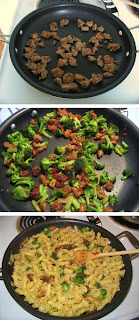
Pasta comes to the rescue a lot around here, especially if we’re looking for a quick meal. Last night I made a simple Shrimp Scampi. It’s a snap to make so it serves as a great weeknight dinner. The interplay of robust garlic, tangy lemon, and fresh parsley with tender succulent shrimp in a delicate white wine sauce is fantastic. A teeny tiny bit of cayenne adds a kick but it’s completely optional. Adding the lemon juice and zest and parsley last helps preserve their bright flavor.

Shrimp Scampi with Linguini
8 oz. large shrimp, peeled and deveined (smaller shrimp can be used but shorten the cooking time)
1 small shallot, finely chopped
3 - 4 cloves garlic, minced
Juice of half a lemon, about 1 to 1 1/2 Tbsp
1/4 to 1/2 tsp lemon zest
1/4 C dry white wine
2 Tbsp parsley, finely chopped
2 tsp olive oil
2 Tbsp butter
Salt and pepper to taste
cayenne, optional
8 oz. linguini (I used spaghetti)
The cooking goes by very quickly so I did my ingredient prep as I was waiting for the water to boil.
Bring a pot of salted water to a boil for the pasta. When you drop the pasta in the water, start cooking the scampi.
Season the shrimp with salt and pepper. Heat 2 tsp of olive oil in a skillet over medium high heat and cook the shrimp until they turn opaque and just pink, about 30 seconds to a minute or so each side. Transfer to a bowl and set aside.
Return the pan to the stove, add 1 tbsp of butter and the shallots. Cook over medium heat until the shallots are translucent and begin to brown around the edges, about 3 to 4 minutes. Add the garlic and cook for 30 seconds until fragrant. Add the white wine and deglaze the pan, scraping up the brown bits from the pan, then add the lemon juice, bring it to a boil then take off heat. (Remember to keep an eye on your pasta)
Off heat, whisk in the remaining tbsp of butter, lemon zest, parsley, and a little bit of cayenne. Add the shrimp and pasta, toss to combine and serve immediately.
Serves 2.
As for the other half of the lemon and remaining zest on the peel, you can juice the half and freeze the juice in an ice cube tray for another day. You can also freeze the peels to save them. Grate the peels while they're still frozen; don't let the peels thaw or they'll be too squishy to zest.
Links:
 This will be my entry for Presto Pasta Night. Presto Pasta Night is hosted every week by the wonderful Ruth over at Once Upon a Feast. Be sure to check out this week's roundup on Friday.
This will be my entry for Presto Pasta Night. Presto Pasta Night is hosted every week by the wonderful Ruth over at Once Upon a Feast. Be sure to check out this week's roundup on Friday.

































